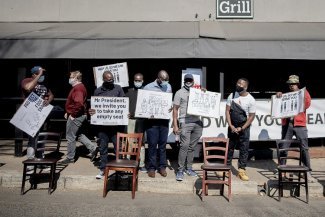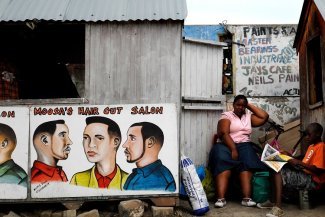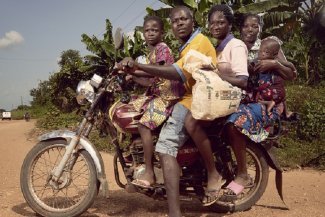
Participants in the ‘Fostering Sustainable Development through Social Dialogue in Africa’s Fragile States’ project are photographed outside La Bourse de Travail in Ouagadougou, Burkina Faso on 7 July 2022, the building which houses the four national centres in Burkina Faso that were involved in the project.
The West African region has long been a mosaic of complex peace and security challenges. In recent years, the region has confronted a convergence of multiple threats, intricately weaving an even more complex tapestry of concerns. The menacing rise of violent extremism, the scourge of piracy on its coastal waters, the stark chasm of social inequality, and the shadows cast by election-related violence have compounded the delicate situation created by pre-existing conflicts. Consequently, insecurity has had multifaceted and adverse effects on workers and trade unions, ranging from physical safety concerns to economic hardship, to dampened productivity, job losses and psychological distress. In response to these challenges, trade unions in Sierra Leone and Burkina Faso embarked on an initiative that is reshaping the landscape and redefining the role of unions in these countries.
Fostering Sustainable Development through Social Dialogue in Africa’s Fragile States is a project supported by the international arm of the Dutch national centre FNV Mondiaal and spearheaded by ITUC-Africa. This ground-breaking project isn’t merely about providing unions with social dialogue tools; it’s about empowering them to be champions of peace.
Launched in August 2021 and wound up in September 2023, the project was implemented in partnership with the Sierra Leone Labour Congress (SLLC) in Sierra Leone and Confédération Syndicale Burkinabé (CSB), Confédération Nationale des Travailleurs Burkinabé (CNT-B), Organisation Nationale des Syndicats Libres (ONSL), Union Syndicale des Travailleurs du Burkina (USTB) in Burkina Faso.
The state of fragility in Burkina Faso and Sierra Leone
Insecurity in Burkina Faso and Sierra Leone has had profound and far-reaching effects on workers and trade unions. Since 2015, the Burkinabè government has been grappling to fight a jihadist insurgency which has resultantly displaced over two million people. Frequent incidents of violence and attacks by terrorists continues to pose direct threats to the physical safety of workers which has consequently disrupted economic activities, leading to reduced productivity and income loss.
The insecurity in Burkina Faso has also led to the loss of livelihoods with the devastating consequences for families and communities, leading to economic hardship, increased poverty, and vulnerability. Most workers, especially those in the agricultural sector have been internally displaced. Workers and their families have been forced to flee their homes and communities in search of safety, leaving behind their jobs and livelihoods.
According to UNICEF, on the first day of the new 2023-2024 academic year in Burkina Faso, at least 1 in 4 schools – or 6,149 – remained shut due to ongoing violence and insecurity in parts of the country. As a result, more than 31,000 teachers and over one million children can no longer go back to their classrooms, fearing for their safety. Out of school, they remain exposed to many threats.
Since the military seized power in September 2022, there has been an erosion of workers’ rights in Burkina Faso as insecurity is sometimes used as a pretext to suppress workers’ rights and restrict their ability to organise, unionise, or collectively bargain. In some cases, trade unionists face harassment, intimidation, or even violence, making it challenging to protect the rights and interests of workers.
Sierra Leone has come a long way in its journey towards peace and security since the end of its brutal civil war in 2002. The country, once marred by conflict, has made significant progress in establishing and maintaining stability. Despite the significant progress made, however, Sierra Leone still faces several challenges related to peace and security such as youth unemployment, poverty, gender-based violence and vigilance and extremism, among other issues. During the campaign period for the 2023 general elections, the country experienced some spats of politically motivated violence.
Shifting priorities: from wages to peace
Traditionally, trade unions have been synonymous with advocating for better wages, improved working and living conditions, and labour rights. Yet, the innovative project in Burkina Faso and Sierra Leone has prompted unions to expand their horizons, encouraging them to embrace peace and security as paramount concerns. The project recognises a fundamental truth: without stability, economic progress remains elusive. As such, unions in these two West African nations are rising to the challenge of fostering peace with remarkable zeal.
Central to this transformation is the project’s relentless focus on enhancing the capacity of trade unions to engage effectively in social dialogue. This goes beyond providing them with skills; it’s about equipping them with the knowledge and resources to engage constructively with employers, government officials, and other stakeholders. The ultimate goal? To cultivate an environment where open discussions lead to outcomes that benefit all parties involved, nurturing a culture of enduring peace.
Perhaps one of the most outstanding achievements of this project are the peace forums initiated by trade unions. These forums serve as dynamic platforms for open and inclusive dialogue, bringing together stakeholders from diverse sectors of society. Through these forums, unions are actively engaging with local communities, civil society organisations, religious leaders, artists and government officials to address the root causes of conflicts and promote peaceful coexistence.
Another one of the project’s critical components is comprehensive training on Illicit Financial Flows (IFFs) and their far-reaching consequences on the global workforce. Trade unions have gained invaluable insights into how these covert financial activities perpetuate inequality, hinder economic growth, and undermine social stability. Armed with this knowledge, unions are now formidable advocates for policies that combat IFFs, ensuring that resources are redirected towards providing social services and uplifting workers, enhancing equality, and fostering an environment conducive to lasting peace.
A profound transformation
The impact of this project on trade unions in Burkina Faso and Sierra Leone has been nothing short of profound. They have emerged as proactive advocates for peace, transcending their traditional roles. By championing social dialogue, trade unions have played a pivotal role in defusing tensions, resolving conflicts, and building bridges between diverse groups. Moreover, the project’s focus on IFFs has equipped unions with a more comprehensive understanding of the global economic system, enabling them to advocate for policies that promote transparency and accountability. If embraced, these policies will in the long run contribute to more equitable and sustainable economic growth.
One noteworthy outcome of the project has been the amplification of women’s participation in both countries. The project has created spaces where women have found their voices and made invaluable contributions to the dialogue on peace and security. Notably, women are often the most affected by the ravages of war, and this project has increased their participation in discussions and peace forums. Women have become the guardians of peace, and their active involvement is reshaping the narrative.
The ultimate goal of the project was to contribute to sustainable peace and security in Burkina Faso and Sierra Leone. It has not only achieved this goal but it has also catalysed a significant expansion of the trade unions’ mandate in both countries.
Traditionally, these unions primarily focused on the day-to-day challenges faced by workers, such as advocating for labour rights, pushing for equitable wages, and improving working and living conditions. However, this project has prompted a profound paradigm shift. It’s clear that union work extends far beyond immediate concerns and is intrinsically linked to broader issues of peace and security, which directly impact workers’ productivity and overall working conditions.
Based on the prevailing peace and security situation in the two countries, the project was highly relevant as it addressed the real needs of the populations, contributing to the consolidation of peace, which is directly linked to prosperity in any region.
In the words of Sierra Leone’s Labour Minister, the Hon. Mohamed Rahman Swaray: “The project educated the masses, which is crucial to the country’s development.” By actively engaging in peace and security initiatives, unions not only safeguard their members’ interests but also make a profound statement about their commitment to the holistic well-being of the workforce. The project has illustrated that unions can act as powerful catalysts for positive change by addressing the root causes of conflicts and insecurity, thereby fostering an environment conducive to economic growth and job preservation.
The journey of trade unions in Burkina Faso and Sierra Leone represents a beacon of hope for unions worldwide. By prioritising peace alongside economic interests, these unions have become catalysts for positive change in fragile states. As these unions continue to forge ahead, their work stands as an inspiration, demonstrating that through strategic focus and collaboration, unions can be powerful advocates for peace, security, and prosperity in even the most challenging contexts. The project leaves an enduring mark on ITUC-Africa and the future of labour movements worldwide, illuminating a path towards lasting peace and development.












